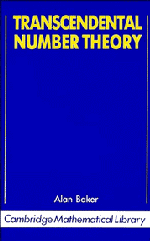Book contents
- Frontmatter
- Contents
- Preface
- 1 The origins
- 2 Linear forms in logarithms
- 3 Lower bounds for linear forms
- 4 Diophantine equations
- 5 Class numbers of imaginary quadratic fields
- 6 Elliptic functions
- 7 Rational approximations to algebraic numbers
- 8 Mahler's classification
- 9 Metrical theory
- 10 The exponential function
- 11 The Siegel–Shidlovsky theorems
- 12 Algebraic independence
- Bibliography
- Original papers
- Further publications
- New developments
- Index
7 - Rational approximations to algebraic numbers
Published online by Cambridge University Press: 01 June 2011
- Frontmatter
- Contents
- Preface
- 1 The origins
- 2 Linear forms in logarithms
- 3 Lower bounds for linear forms
- 4 Diophantine equations
- 5 Class numbers of imaginary quadratic fields
- 6 Elliptic functions
- 7 Rational approximations to algebraic numbers
- 8 Mahler's classification
- 9 Metrical theory
- 10 The exponential function
- 11 The Siegel–Shidlovsky theorems
- 12 Algebraic independence
- Bibliography
- Original papers
- Further publications
- New developments
- Index
Summary
Introduction
In 1909, a remarkable improvement on Liouville's theorem was obtained by the Norwegian mathematician Axel Thue. He proved that for any algebraic number α with degree n > 1 and for any κ > ½n + 1 there exists c = c(α, κ) > 0 such that |α–p/q| > c/qκ for all rationals p/q (q > 0). His work rested on the construction of an auxiliary polynomial in two variables possessing zeros to a high order, and it can be regarded as the source of many of our modern transcendence techniques. The condition on κ was relaxed by Siegel in 1921 to κ > s + n/(s + 1) for any positive integer s, thus, in particular, to κ > 2√n, and it was further relaxed by Dyson and Gelfond independently in 1947 to κ > √(2n). The latter expositions continued to involve polynomials in two variables and further progress seemed to require some extension of the arguments relating to polynomials in many variables; in fact special results in this connexion had already been obtained by Schneider in 1936. A generalization of the desired kind was discovered by Roth in 1955; he showed indeed that the above proposition holds for any κ > 2, a condition which, in view of the introductory remarks of Chapter 1, is essentially best possible.
- Type
- Chapter
- Information
- Transcendental Number Theory , pp. 66 - 84Publisher: Cambridge University PressPrint publication year: 1975



